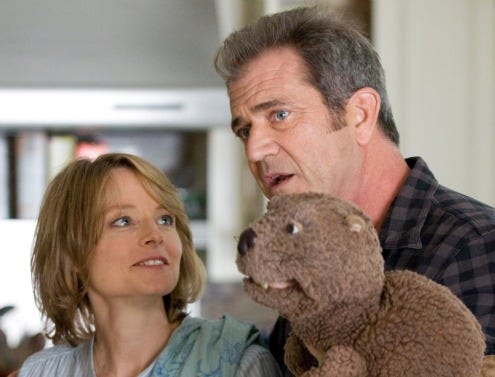The Beaver

How wonderfully unexpected "The Beaver" is. Just when you think you've got it figured out, this daring and heartfelt film takes another astonishing turn.
The story of a wasted man who finds he can only talk through a furry hand puppet, it wears the clothes of a comedy, but there are sequences of the blackest moods imaginable. Audiences will be kept reeling, not knowing when to laugh and when to bask in the solemn weight of tragedy.
At the screening I attended, the same scene often produced the opposite reaction in different people. Normally, I cringe when people guffaw at what is clearly intended to be a serious moment, but with "The Beaver," I didn't mind because the movie's appeal is centered in its ambiguity.
It's hardly a perfect film. Surprisingly, because it's directed by a woman (Jodie Foster), the female characters seem underwritten, existing mostly to facilitate the emotional journey of the males in their lives. And the film makes a sudden left turn near the end that I know is going to alienate half the audience.
All I can say is it was a thrilling experience to go into a movie without any notion of where it was headed. In an era of safe filmmaking with stories and characters tied in uniformly neat bows, "The Beaver" operates outside the box ... and then it kicks the box down the street.
The film's unruly success is anchored by its wayward star, Mel Gibson. I know, we're all legally required to hate Mel these days because some hateful stuff spills out of him in unguarded moments. To quote Captain Renault from "Casablanca," I'm shocked, shocked to discover that human frailties exist among the above-the-title folks.
Other Hollywood icons have abused their children, like Joan Crawford, or drugged and sodomized a 13-year-old, like Roman Polanski. Even Charlie Chaplin had an insatiable desire for underage girls (even if he often ended up marrying them). Yet I still watch their movies and am transported above the sulfurous bile of their earthly failings.
In Gibson's case, his recent notoriety actually ends up helping the movie. The screenplay — an original (in the truest sense of that word) by rookie Kyle Killen — starts right off with Walter Black (Gibson) already down in his pit of despair. We don't really know how he got to the bottom, but Gibson's troubles act as a shorthand for the self-loathing descent he obviously experienced.
Walter is the CEO of Jerry Co., a floundering toy manufacturer. He cannot speak to his wife, Meredith (Foster), or their sons, young Henry (Riley Thomas Stewart) and high school senior Porter (Anton Yelchin). Nor can he really summon the energy to do anything but sleep.
Finally kicked out by Meredith, he discovers a frayed old beaver hand puppet in a dumpster and puts it on. Awaking from a stupor the next morning, he finds the puppet talking to him in a low-rent British accent (I thought of Ray Winstone). He introduces himself as the Beaver and tells Walter he's here "to save your miserable life."
Soon, Walter and the Beaver have reunited with the family, and everything's hunky-dory again. Meredith is a little put off by the puppet at first, but when Walter produces a card from his psychiatrist authorizing it as therapy, she's thrilled to have her husband back again.
Not so much Porter, who so despises his dad he compiles a list of the similarities he shares with him, which he keeps as a list of shame. Porter has a side business writing term papers for classmates and is gobsmacked when the cheerleader valedictorian (Jennifer Lawrence) taps him to craft a graduation speech for him.
I don't want to give away any more because the film's serendipity is its main charm. "The Beaver" always kept me guessing, and even though it ventures into places some people may not like, I respect it as an exercise in genuinely brave moviemaking.
4 Yaps



